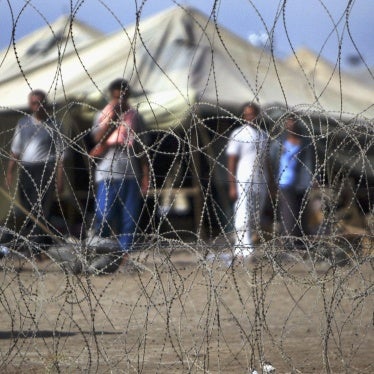(New York) The United States should abandon reported plans to send Uighur detainees currently held at Guantánamo Bay to China, where they are likely to face mistreatment and possibly torture, Human Rights Watch said today.
More than a dozen ethnic Uighur separatists were apprehended in Afghanistan and transferred to the U.S. military detention facility at Guantánamo Bay in Cuba. They were reportedly training in Afghanistan with Uighur groups seeking independence or greater autonomy from China for the northwestern province of Xinjiang.
China has a long and well-documented history of repression of the Uighurs, a Muslim, Turkic-speaking community. The government has systematically tortured and otherwise mistreated suspected separatists. The death penalty has been used against those found guilty of separatist activities after trials that do not meet international fair trial standards. Annual U.S. State Department human rights reports have consistently and strongly criticized China for the mistreatment of ethnic Uighurs. Reflecting these concerns, the United States has urged China to allow the United Nations Special Rapporteur on Torture to visit China and have access to its prisons and other places of detention.
“The United States should not even contemplate returning ethnic Uighurs to China,” said Brad Adams, executive director of Human Rights Watch’s Asia division. “Any assurances from China that it will not mistreat returnees would not be worth the paper they are written on. It would be impossible for the United States to prevent mistreatment of these detainees once they fall into China’s abysmal prison system.”
While insisting that the United States should not return Uighurs to China, Human Rights Watch reiterated its longstanding objection to the practice of detaining individuals indefinitely without charges at Guantánamo in violation of international human rights law and international humanitarian law. Persons for whom there is no legal basis to detain must be released to countries where they will not face torture or mistreatment.
The problems of rendition of suspects to countries that routinely practice torture was highlighted by the case of Maher Arar, a Syrian-born Canadian citizen, who was transferred by the United States to Syria after being detained in New York. On November 4, Arar publicly asserted that while held in Syrian prisons for ten months he was repeatedly tortured by being whipped with a thick electric cable and threatened with electric shocks. The United States claimed that it had received assurances from Syria that Arar would not be mistreated.
“As with Arar and Syria, it is a fallacy to believe that a state that systematically practices torture will magically transform itself simply because it has offered diplomatic assurances,” said Adams. “It would be extremely reckless to accept written assurances from China in these cases. If these men are returned and anything happens to them, it will be the responsibility of the United States.”
Expelling, returning or extraditing a person to a country where there are substantial grounds for believing that he or she would be subjected to torture is a violation of the Convention against Torture and Other Forms of Cruel, Inhuman or Degrading Treatment or Punishment, a treaty that the United States ratified in 1994.
The Bush Administration has acknowledged this obligation, and asserts it does not render suspects if it believes it is likely that they will be tortured. On June 25, the U.S. Defense Department General Counsel, William Haynes, wrote to U.S. Senator Patrick Leahy: “Should an individual be transferred to another country to be held on behalf of the United States, or should we otherwise deem it appropriate, United States policy is to obtain specific assurances from the receiving country that it will not torture the individual being transferred to that country. We can assure you that the United States would take steps to investigate credible allegations of torture and take appropriate action if there were reason to believe that those assurances were not being honored.”
The United States apparently is considering sending the Uighurs to China because it believes they do not constitute a threat to the United States and presumably have committed no crimes. Yet it is reportedly insisting that those released be investigated and imprisoned upon repatriation.
“The United States operates a system in Guantánamo in which detainees are held without charges and without access to lawyers or family members,” said Adams. “It now proposes to compound this travesty of justice by sending these men to a country in which the presumption of innocence is routinely turned on its head.”
Human Rights Watch urged the Bush Administration to institute a moratorium on the rendition of persons to countries that routinely use torture until it has undertaken a broader review of the U.S. practice with regard to renditions. The review must examine the nature of the assurances the United States receives from countries prior to transfer, the steps it takes to ensure persons are not abused after rendition, and the actual fate of those who have been turned over to countries known to practice torture. Before it lifts the moratorium, the United States must also ensure that its own practices are consistent with U.S. and international law, and that procedures are in place to protect transferred detainees from being subjected to torture or other cruel, inhuman or degrading treatment.
The potential return of Uighurs to China is particularly worrisome given the longstanding, highly emotional situation in Xinjiang. Armed Uighur groups have bombed and attacked Chinese government and military targets. Human Rights Watch has condemned separatist violence, as well as the systematic repression by China against Uighurs and Muslims in Xinjiang. China has opportunistically used the international “war on terror” to conflate armed separatists with those advocating peaceful efforts to obtain independence or greater autonomy.








